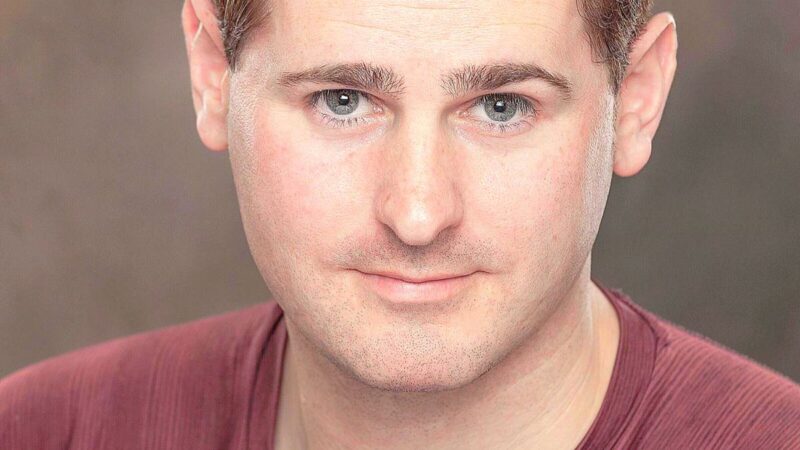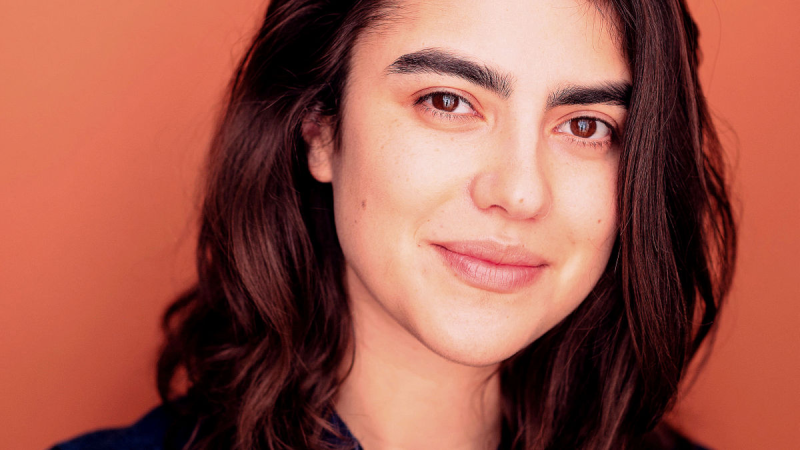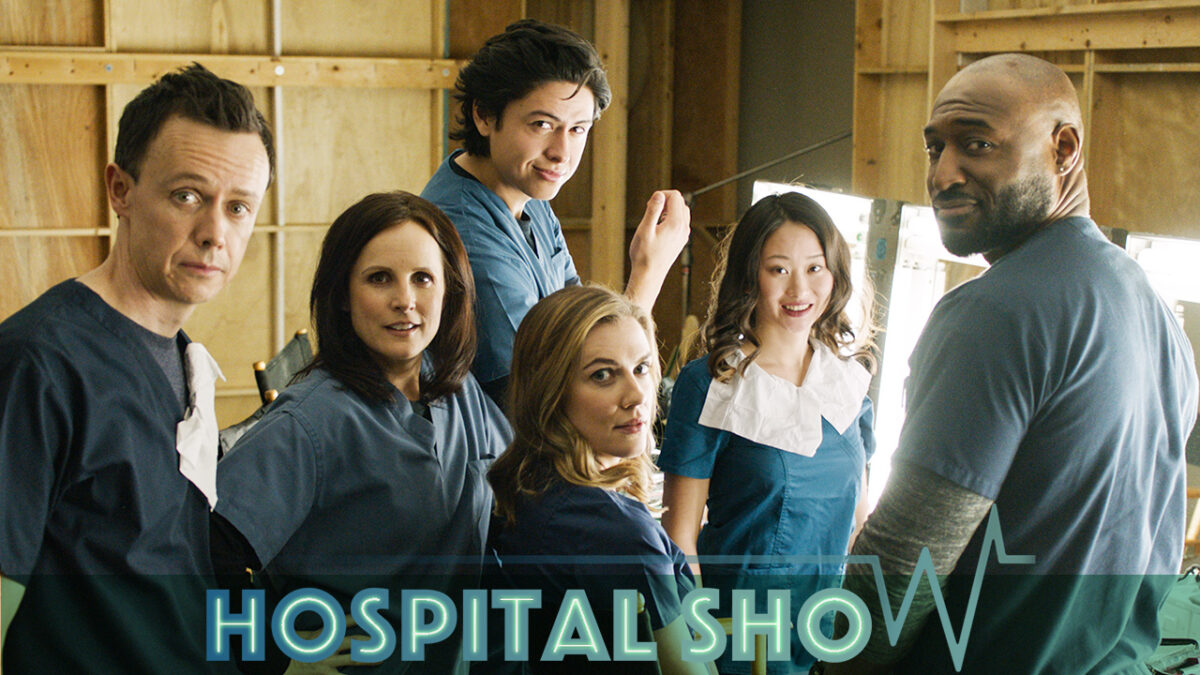
Narrative | Dramatic Features
Film Name: Hospital Show
Genre: Workplace Comedy
Date: Completed and released in November 2019
Director: Adam Greydon Reid
Producer: Adam Greydon Reid
Writer: Adam Greydon Reid
Cinematographer: Devin Karrington
Line Producer: Mike Wavrecan & David Roncin
Production Designer: Caitlin Byrnes
Music: Sarah Slean
Production Company: BullRush Pictures
Budget: $349,000
Financing: The Bell Fund, the Independent Production Fund, and Telus (Broadcaster)
Awards:
– Best Short Form Comedy (Stareable Fest)
– Best Web Series (Leo Awards)
– Best Comedy (Canadian Cinematography Awards)
– Best Web Series (Florence Film Awards)
Website
indieactivity: What is your film about?
Adam Reid (AR): Hospital Show is a 10-episode workplace comedy about the broken, deluded, loveable actors who play TV’s most respected doctors. The series centers around a med-school dropout (played by Sara Canning) who could have been a real doctor, but instead now plays one on TV. For me, creating the digital series was part of a development process, the intention is to keep evolving it into a half-hour series.
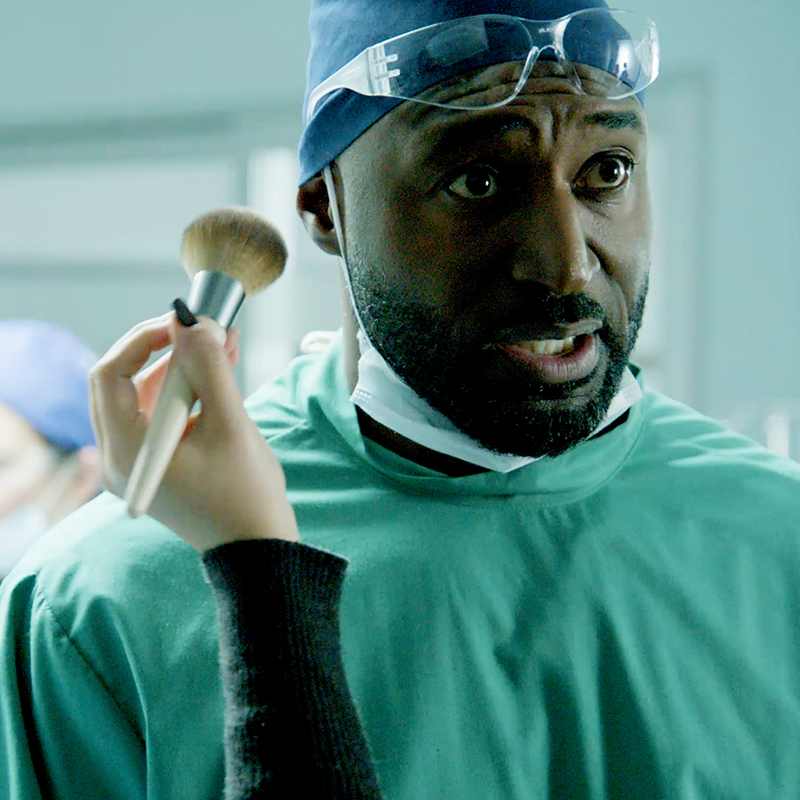
Tell us about the festival run, marketing, and sales?
Adam Reid (AR): I was very fortunate to access the maximum funding one can receive in Canada from agencies that support digital series production (the Bell Fund, the IPF, and Telus). However, with that funding, I was obligated to release the series on a Canadian digital platform. So, the first hurdle for us was convincing one of the funding agencies that we would have a more effective release over YouTube. I wanted the content to be released for free, to be widely available (not Geo-blocked), and I wanted to be able to direct viewers and fans easily to the YouTube link from our social media or advertising channels. Plus releasing on YouTube meant I could collect data and analytics and understand who our audience was. Two days before we were set to release the series, I got permission to release it on YouTube – which was the right move. And we were off!
I had a completely separate budget for marketing and worked with a company called Forge and Spark out of Vancouver to release the series. They organized all our social media channels and spearheaded the YouTube campaign. I could not have done it without them. I also worked with two amazing consultants in the U.S. who we looped into all our decisions.
We began our release with our organic followers mostly on IG and FB which we developed from the moment we began filming – these organic followers skewed female. We also capitalized on our actors’ own social media followings for the release. Our cast are all seasoned well known Canadian actors who have appeared on shows like Riverdale, Vampire Diaries, V-Wars and Altered Carbon – so just within our actors’ followers, we could promote the show to over 1.5 million people. From there we had a modest budget to pay for some Google and YouTube advertising using 15 second teasers to bring people to our channel, or to the episode we were promoting. That boosted our viewership and actually brought in more male viewers than female – so our audience became 60% male, 40% female once advertising kicked in, with a high concentration between the ages of 18-35 and an even split above that. In the end, we averaged about 30-35k views per episode, and have reached approx. 560k views over all our content on the channel including bonus material and trailers. Our social media following is still growing but just after our release finished this past January, we were at 2.6 million social media impressions, 120k engagements, and 9.2 million giphy impressions. For me, this was a huge success – we used the money we had wisely.
The official trailer for Hospital Show created by Adam Reid, starring Sara Canning, Adrian Holmes, Jordan Connor, Enid-Raye Adams, and Valerie Tian.
The festival circuit has been really successful as well. It’s great to see our series resonate with so many people around the world. We’ve won Best Short Form Comedy at Stareable Fest 2020 which was a huge honor, Best Web Series and Male Performance at the 2020 Leo Awards, Best Comedy at the Canadian Cinematography Awards, and Best Web Series at the Florence Film Awards. We were also a double nominee at the Canadian Screen Awards, Canada’s Emmys. And we’ve been an official selection and award nominee at the Marseille WebFest, Seoul WebFest, T.O. WebFest, Melbourne WebFest, Copenhagen WebFest, AFIN, Rio WebFest, and L.A. Live.
Give the full Official Synopsis for your film?
AR: HOSPITAL SHOW is a workplace comedy about the loveable, deluded, often wounded actors, who play TV’s most respected doctors on the hit primetime medical drama Critical Condition. These actors may dispense miracle cures with gleaming smiles and spotless white coats, but beneath the heavy makeup is a dumpster fire of high school politics, power trips, and puerile shenanigans. Funny, fast-paced, and rooted in character, HOSPITAL SHOW tells the story of a dysfunctional family of fake surgeons. Just like us, they have problems, hope for love, and search for shiny pearls amidst life’s bullshit. Before that, however, they have to go to Hair and Makeup. In the center of this petri-dish of dysfunction is the whip-smart Charlie Nielson, a med school dropout-cum-actress, who was on track to become a respected doctor, but instead, now plays one on TV.
Development & Financing?
AR: I wrote HOSPITAL SHOW originally as a half-hour pilot, then when I realized I wanted to make it, not pitch it around to networks, I decided I could make it as a web series with independent funding that exists for digital series development in Canada. I took my pilot, expanded it a bit, and created 5-7-minute chapters that stood alone but also formed one large over-arching story. So, in the end, I was producing two things – a short-form digital series AND a 55-minute SUPERCUT/proof of concept. It proved to be a really wonderful, liberating creative opportunity. Not since film school had I really done something completely for myself, on my own terms so I’m really thankful to our funders. Over the years I’ve been busy working and making things for other people, like commercials, so this was an opportunity to re-discover my voice as a filmmaker.
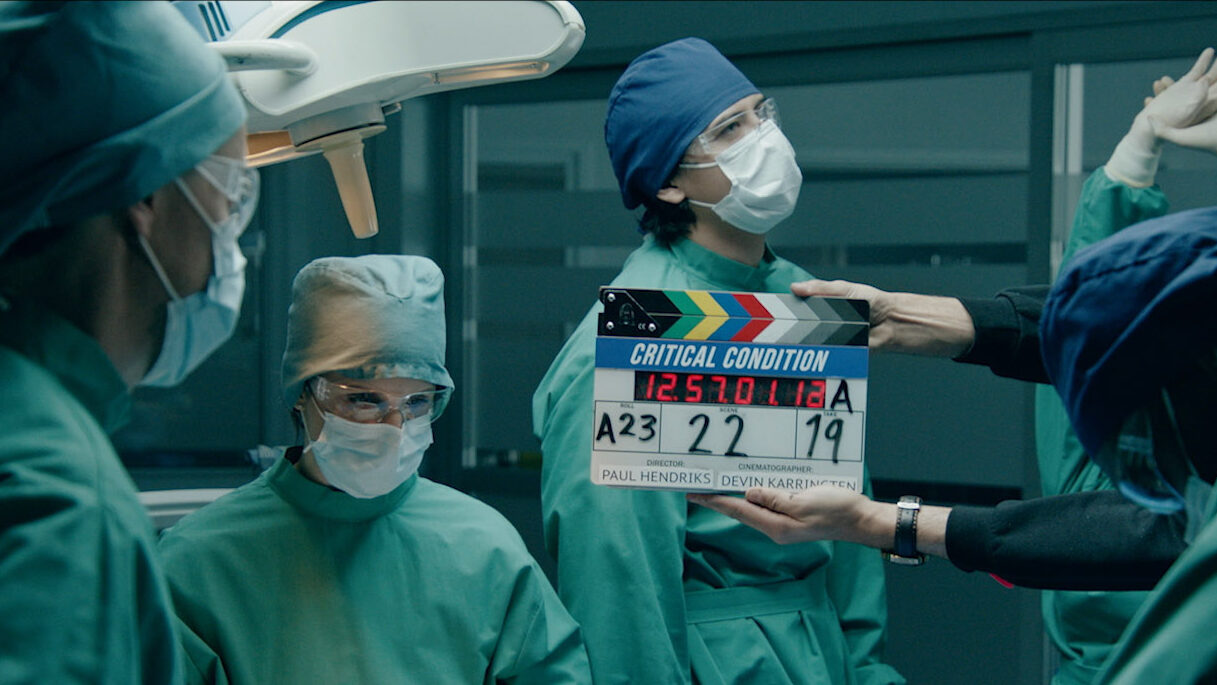
Philosophically, the core of this series comes from my life as an actor, and some of the scenarios either came from my own history, or from things I’ve heard over the years from friends or from our cast – (Sara Canning and Kristin Lehman for example had a few gems). I think a lot of it though sprung from my DNA of being a performer since I was twelve. It’s the waters I’ve swam in for most of my life so I wanted to tell a story about these television actors in a very human, non-glamorous way. I wanted to show this world as a simple, if insane workplace – where people just go to work, get dressed up, and pretend to be other people for a living. The concept of playing doctors came to me because I wanted to create a certain amount of irony in the setting – if it’s a show about broken, deluded, narcissistic, and loveable actors – where can I put them? Putting them in a hospital, playing doctors seemed perfect to me because here we have these people, pretending to be healers when they need the healing themselves.
The tone of the show is very grounded and played straight, however, we do go to some absurd, broad places by the end of the series, which was fun.
In terms of the financing, in Canada, it’s not super easy to access, but if you can do it, there’s a lot of funding at our disposal for web series creation. We’re very lucky. I began this process by creating a pitch trailer, which worked really well. And with that, I was able to apply to the funding agencies – the Independent Production Fund, the Bell Fund, Telus. Then once I added federal and provincial tax credits to the mix, we were able to raise $349,000 – which seems like a huge amount compared to so many independent productions, and it is. But this concept required that kind of funding to pull off properly – I needed a hospital, I needed to fill it, I had a huge cast, etc. – so it was a lot of moving parts and the money went fast. It’s also partially why I wore so many hats – I was the producer, director, writer, and editor by choice, but really, I had no choice because no one else was going to work on spec as I did.
Production?
AR: We shot 5 days at Riverview Hospital for all of our interior hospital stuff, and two days at Bridge Studios in Vancouver for exteriors and for the scenes that took place in trailers. Riverview hospital is a very unique location in Vancouver – it’s a former psychiatric hospital that was shut down in the 70s, so it’s a huge sprawling empty facility now used exclusively for film shoots. The property has several buildings you can access and you need to be very specific about which floors and which rooms you’re going to use. Since so many big-budget films and TV series’ use this place, some of them have modernized floors and built permanent sets – so the large glass sliding doors for example that feature in our series were built by another production, as was the entire Operating Room set that’s also surrounded by glass and glass doors. So, there’s a lot of production value in our series that was actually built by other productions. All we needed to do was rent all the expensive medical equipment that filled each room.
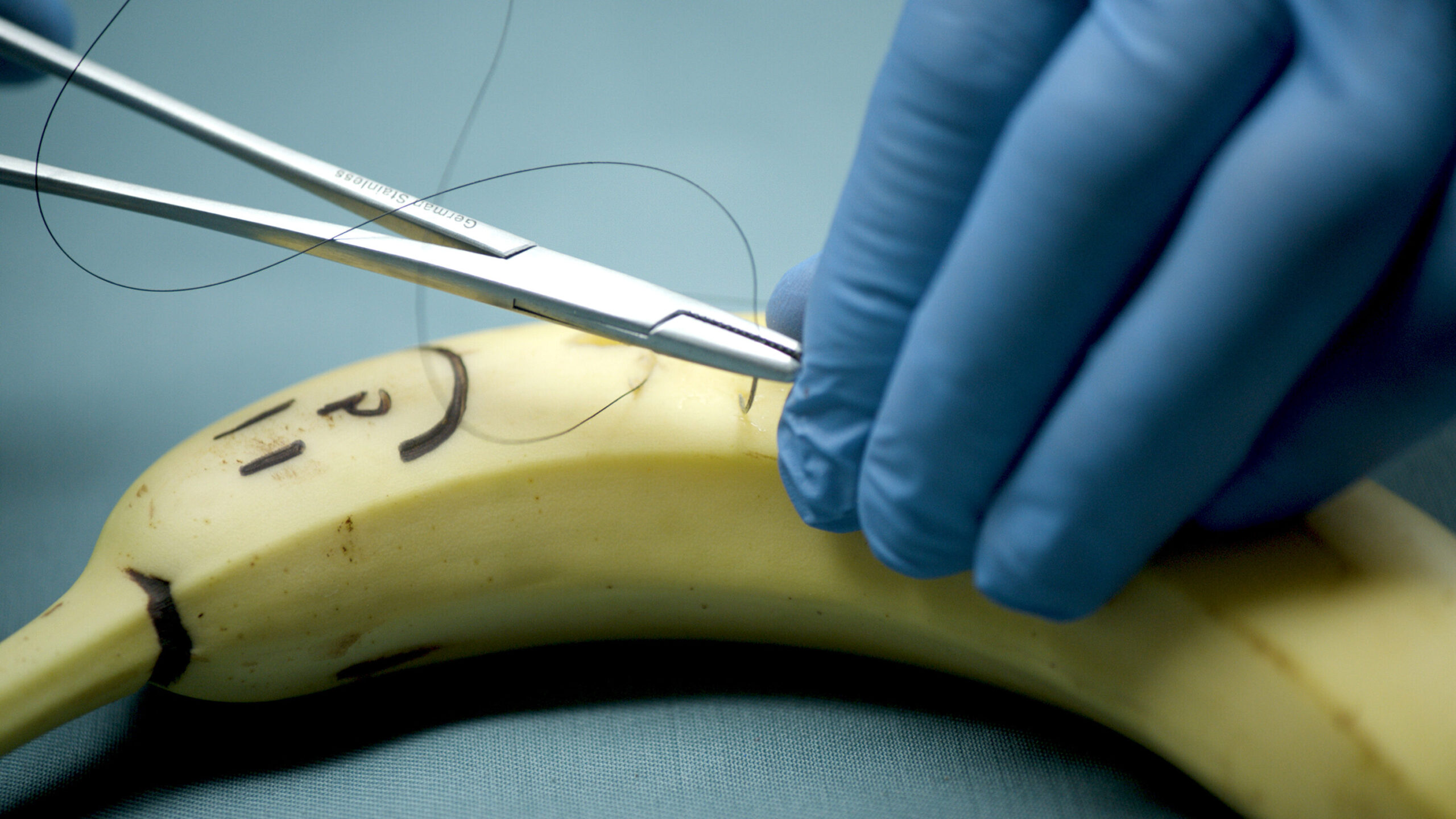
For our scenes that take place in cast trailers – since almost every character in the series has their own scenes in their own trailers, what we did was rent one large single trailer, and then changed up the art direction for every character to make them look like different trailers. And then there’s a number of shots and scenes that take place outside in the trailer village. All those trailers are for a different production, we only had one of them for ourselves, so we capitalized on the studio location to make our show look like a much bigger show.
Part of what I loved about this process was producing, directing, and editing everything. It was a huge learning curve for me to produce – I learned so much – from the financing side of it to the contract negotiation side, to working with the unions, etc. I would say that was the hardest job for me because it doesn’t come naturally. Then for the post, since I edited all ten episodes it took me from January till about June or July to finish my cut, then there was sound mixing before we released it in late October of 2019.
Our DOP is a fellow by the name of Devin Karringten, he’s not only a lovely person but a master of his trade. He’s a young guy who’s been working in the industry since he was fifteen, his step-dad was a camera operator and he learned the practical side of lighting with him early on by shooting 35mm film. He shoots commercials normally and I think that reflects in the way Hospital Show looks. We both wanted the series to look lush, and aesthetically beautiful. A lot of comedies are shot with a flat lighting scheme and Devin went the opposite way- he gave our series a beautifully cinematic look.
In terms of the music- ever since I conceived of the idea for Hospital Show, I’ve had one song on my desktop that has inspired the writing process, Sarah Slean’s “Everybody’s On TV”. It’s a wonderful pop song with an ironic slant to it, and I always felt if I could get this off the ground, that would be the theme song. I had no idea how I would get in touch with Sarah, an award-winning, multi-album, big deal in Canada but that was my hope. Then, after I had cut the initial fundraising trailer, I met another director when I was in Toronto shooting a job who ended up being her boyfriend! I was like – hey! Can you show Sarah my project!? And that’s how I connected with Sarah. We hit it off, she loved the material and ended up composing an original song for us “Fake It Till You Make It”, and then composing all the orchestral score that accompanies the network drama “Critical Condition” (the show within our show). She was a delight to work with and I feel her music really elevates our show to a whole other level.
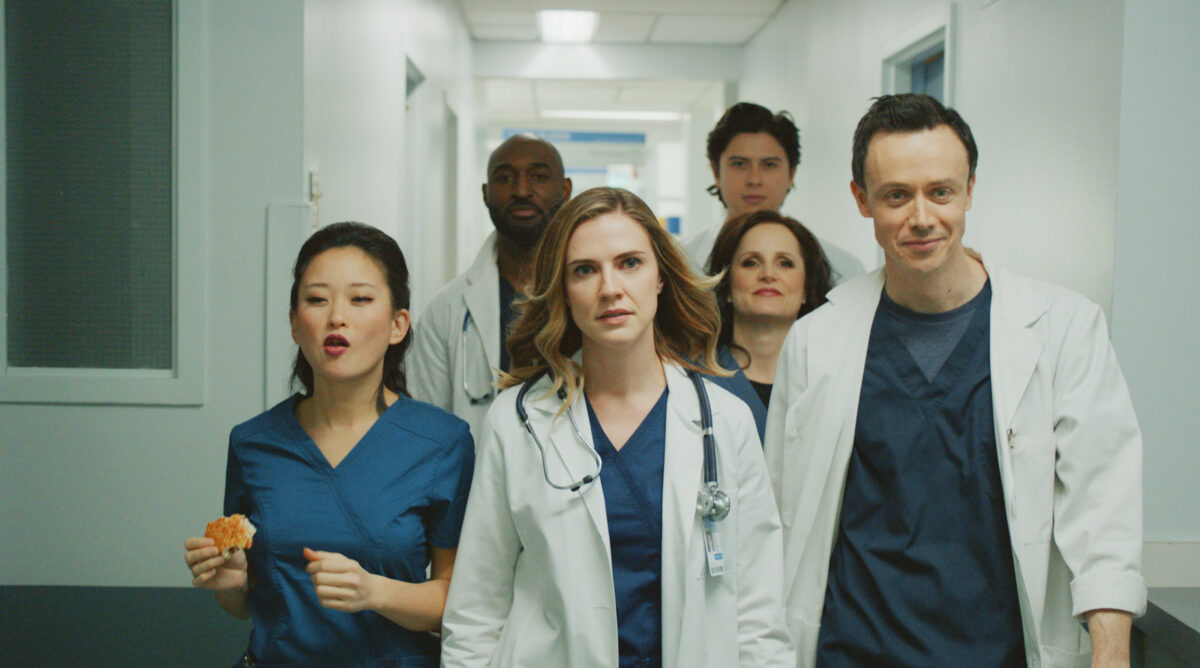
Finally, the cast all came to me in a very organic way. Vancouver is a small town, everybody knows everybody- so I knew most of the people I ended up casting in the series. I did not know Sara Canning but ended up sitting beside her at a dinner and knew from that moment, she was the one to play Charlie. I shared a cab home from the airport once with Adrian Holmes, an award-winning dramatic actor, when I asked him – “ever thought about doing comedy?”. Enid-Raye Adams is a well-known comedic actor in Vancouver, and a friend so she was an easy choice. And I had worked with Valerie Tian before on a series of commercials and loved her quirky natural quality. Jordan Connor was a recommendation from my manager – she offered a couple of ideas for young guys and I looked at Jordan’s work and really liked it. The thing about all of the cast, other than one or two exceptions, this was their first time doing comedy. They’re all naturally funny people but mostly had done dramas, so this was a really fun experience for them. Early on Adrian was trying to find ‘the funny’ in his character and I suggested he play this like a drama and let the script and the situations be ‘the funny’. That concept really clicked for him and for the others because really all you have to do when you’re performing comedy is treat the content and the situations seriously and honestly. I think the more honestly and earnestly you play comedy, the funnier it will be.
Advice from the Filmmaker?
AR: My big advice for storytellers who are thinking about making something is just to push forward and do it. Start putting the plan together, find a way to make it happen and go for it. Whether you have a budget or not – there’s a way to make it happen. Many people along the way in the making of this project told me I should turn around, or not pursue this – that it was too much work or unrealistic, or that they didn’t get the concept…you kind of have to ignore the naysayers and look to the far horizon. Don’t look down too often before taking your next step.
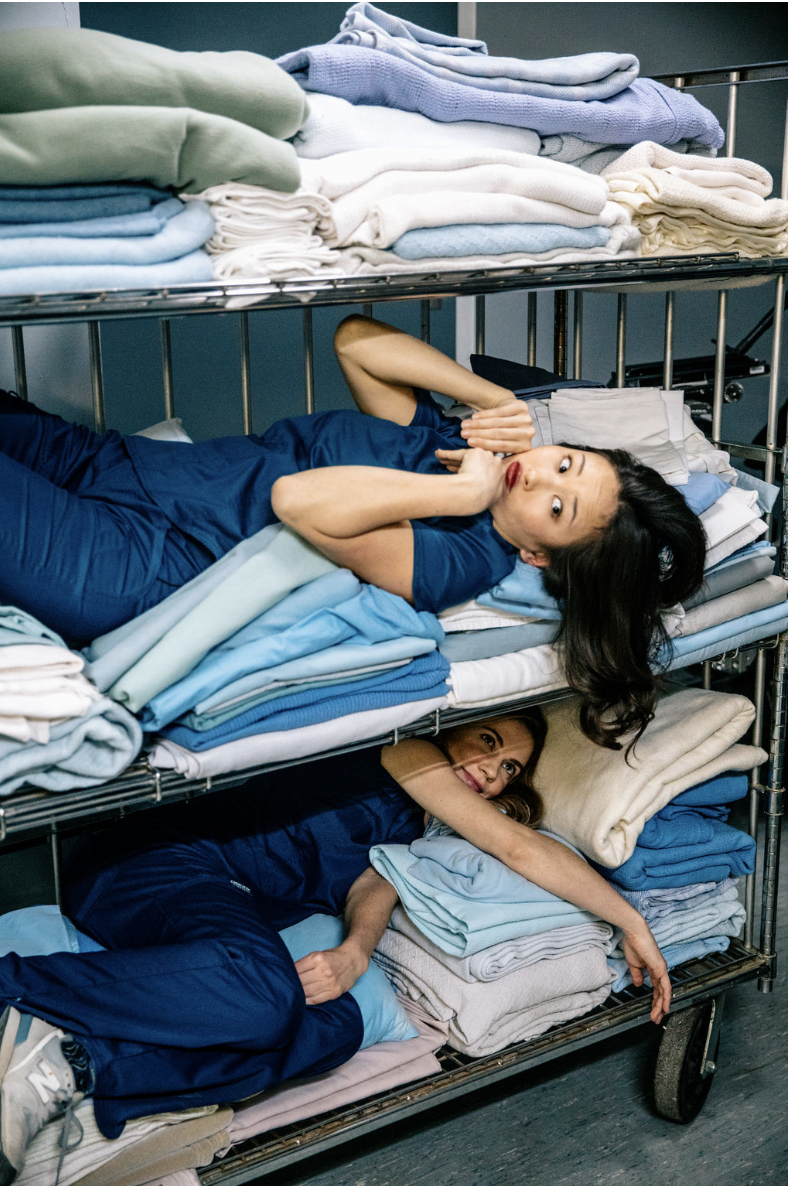
My other piece of advice is – don’t be afraid to ask for help. Don’t be afraid to show your vulnerability. I literally had no idea how to produce something of this magnitude. I didn’t understand the funding process on just about every level. All I did was ask people what to do every step of the way until I got to the tasks I felt comfortable with – like directing or editing. If you don’t know something, find someone who does.
Tell us what you think of the Hospital Show What do you think of it? Genre? More genre? Let’s have your comments below and/or on Facebook or Instagram! Or join me on Twitter
Follow Adam Reid on Social Media
Website
IMDb
Facebook
Twitter
Instagram
YouTube
MORE STORIES FOR YOU

